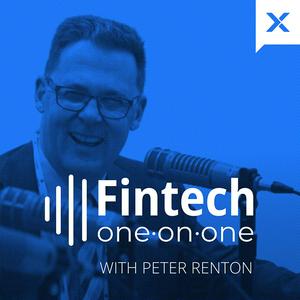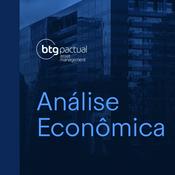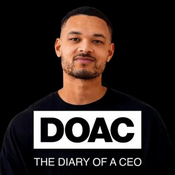617 episódios
Why All Money Will Be On Chain in 10 Years With the CEO of Polygon Labs, Marc Boiron
12/2/2026 | 36minWhat happens when all the world's money moves on chain? That's not a hypothetical for Marc Boiron, CEO of Polygon Labs, it's the company's mission. In this episode, Marc explains how Polygon is evolving from its roots as an Ethereum layer two into the blockchain for global payments, detailing two recent acquisitions that form the foundation of what he calls the "open money stack" - a single API combining on-ramps, wallets, and cross-chain interoperability.
With over $2.5 trillion in transaction volume already processed and partnerships with Revolut, Stripe, Nubank, and dozens of fintechs across Latin America, Africa, and Asia, Marc makes the case that stablecoins are just the beginning. He shares why tokenized bank deposits will be the real game-changer, how banks are already positioning to profit from this shift, and why in 10 years he believes every dollar, whether paying a merchant down the street or sending a remittance across the globe, will move on a blockchain without anyone even thinking about it.
In this podcast you will learn:
How Marc first got interested in blockchain and crypto technology.
Why he decided to make the move to Polygon Labs.
Why Polygon decided to focus on payments.
All the components you need to move money around the world on blockchain.
The idea behind the open money stack.
How Polygon is working with the likes of Revolut and Stripe.
How they differentiate themselves from the other payments blockchains.
What they are doing in AML and sanctions policy.
The scale that Polygon is at today when it comes to transaction volume.
What will the financial system look like when more money stays on chain.
The two things banks ask in their initial conversations with Polygon.
How money will transform in the next 10 years and why most people will not notice.
Connect with Fintech One-on-One:
Tweet me @PeterRenton
Connect with me on LinkedIn
Find previous Fintech One-on-One episodesFrom 70 Hours to Minutes: Vestwell CEO Aaron Schumm on Simplifying and Automating Savings
05/2/2026 | 35minAaron Schumm, CEO and Founder of Vestwell, knows firsthand how broken America's savings system is. When he tried to set up a 401k for his previous 30-person company back in 2010, the process was so difficult, expensive, and confusing that he decided to build a better solution. Today, Vestwell serves 2 million savers with $50 billion in assets, has reduced 401k setup times from 40-70 hours down to just minutes, and runs 14 state-sponsored auto IRA programs including New York's Secure Choice.
In this episode, Aaron explains why fintech has largely failed to move the needle on financial health, too many point solutions that put the onus back on individuals to figure out what to do and then implement it across multiple accounts. His solution? AI agents that will automatically route money from your paycheck to the optimal savings vehicle based on your income, location, tax rates, existing savings, and life circumstances. And he says we're less than a year away from making that a reality.
In this podcast you will learn:
What is broken with the current savings system in America.
The problem at his previous business that was the a-ha moment for Vestwell.
Their initial use case and how they got going.
How their product works exactly.
The three channels they work with.
How they are working with New York State and other government programs.
The conversations they are having with the Federal government around savings programs.
The percentage of employees who typically sign up for an auto-enroll program.
The scale that Vestwell is at today.
What their technology stack looks like.
How much easier it is to set up a workplace savings plan through Vestwell than traditional companies.
The different revenue lines for Vestwell.
How they are working with Amazon.
Why we are not further along in helping Americans with their financial health.
How autonomous AI agents are going to optimize our financial lives in the future.
Connect with Fintech One-on-One:
Tweet me @PeterRenton
Connect with me on LinkedIn
Find previous Fintech One-on-One episodesRate Caps, Stablecoins and the New Credit Infrastructure with Rhett Roberts, CEO of LoanPro
29/1/2026 | 40minThe financial system has run on basically the same payments rails for the past several decades. But there is new infrastructure being built today that takes advantage of the unique capabilities of stablecoins. In some ways, the future is already here as Visa has processed several billion dollars in transactions that have been settled in stablecoins. But who will build the infrastructure needed for credit when we move to this new system?
Today’s guest is Rhett Roberts, the CEO and Founder of LoanPro. I last had Rhett on the show back in 2021, and needless to say, a lot has changed since then. Part of Rhett’s thesis is that this talk around interest rate caps could actually be a catalyst to hasten a movement away from the traditional credit rails. And his company is already working on the systems and protocols to create a new credit infrastructure that runs on stablecoins.
In this podcast you will learn:
How LoanPro has evolved over the past five years.
Why most fintechs are now moving into credit products.
Why both banks and fintechs are using LoanPro to launch new credit products.
Why the idea of an interest rate cap on credit cards is resonating today.
What would happen if a 10% rate cap went into effect.
Why this could be great news for BNPL and the other alternative lending products.
Rhett’s thesis around stablecoins and the value proposition.
The elephant in the room for a stablecoin payments network.
How a line of credit backed by stablecoins could work in reality.
Where the card networks will sit within this new system.
How LoanPro is helping to create these processes and protocols.
Where we will be in five years time with this new infrastructure.
Connect with Fintech One-on-One:
Tweet me @PeterRenton
Connect with me on LinkedIn
Find previous Fintech One-on-One episodesUtah's Hidden Fintech Powerhouse: Ryan Christiansen on Building Bridges Between Academia and Industry
23/1/2026 | 34minRyan Christiansen has had one of the more unusual career trajectories in fintech, from managing credit portfolios during the 2008 financial crisis to leading bank integrations at Finicity during the early days of open banking, helping launch the Financial Data Exchange, and then making an unexpected leap into academia as Executive Director of the Fintech Center at the University of Utah.
In this conversation, Ryan explains why the Center takes a unique multidisciplinary approach spanning business, engineering, and law schools, and shares details about their new master's degree program launching this fall. We also dig into why Utah has quietly become one of the country's most important fintech hubs, with over $1 billion in fintech wages and $7 billion in economic impact. We also discuss the upcoming Fintech Xchange conference on February 4-6 in Salt Lake City, which has become a must-attend gathering for fintech and banking executives looking for substantive content and genuine networking opportunities.
In this podcast you will learn:
Ryan’s background building Finicity’s open banking platform.
How and why he went from the corporate world to academia.
The mission of the Fintech Center at the University of Utah.
The programs the university offers in fintech for its students.
Details of their Masters in Financial Technology program launching in the fall.
Why the fintech scene in Utah is so robust.
Why they decided to create their own event called Fintech Xchange.
What makes Fintech Xchange different.
What attendees can expect at Fintech Xchange this year.
What is most exciting about the work he is doing at the Fintech Center.
Connect with Fintech One-on-One:
Tweet me @PeterRenton
Connect with me on LinkedIn
Find previous Fintech One-on-One episodesThe Embedded Tax Revolution: Ben Borodach, CEO of april, on Building Tax Infrastructure from Scratch
16/1/2026 | 37minI don’t know anyone who enjoys filing their taxes. It is something we begrudgingly do every April, or earlier for the well-organized, and it is usually a somewhat painful exercise. What if filing your taxes was easy, taking less than 30 minutes? What if tax planning wasn't a once-a-year chore but an embedded feature in your banking app, payroll platform, or investment account?
In this episode, I sit down with Ben Borodach, founder and CEO of april, the first company to build a nationally licensed tax engine in over 15 years. Ben shares how april is transforming tax from an annual burden into real-time financial intelligence, partnering with banks, fintechs, and payroll platforms to embed tax services directly into the financial tools Americans already use. We discuss the massive technical challenge of building tax infrastructure from scratch, why embedded tax makes sense for financial institutions, and how bringing tax decisions to the point of transaction, whether selling stock, adjusting payroll withholding, or buying a home, can fundamentally change how people manage their financial lives.
In this podcast you will learn:
How he came to the idea of building a fintech company focused on tax.
How april was incubated inside Team8.
Why they decided to create an embedded tax solution rather than go direct to consumer.
What their product offering does.
How they are helping consumers to think about taxes beyond once a year.
The three categories of companies they are focused on.
Why banks should be offering tax services to their customers.
Why being integrated into the banking cores is not a high priority right now.
How april is different to the big tax providers, TurboTax and H&R Block.
How their customers present the tax offerings.
What it means to be a nationally licensed e-file provider.
How they integrate with the IRS and the state tax agencies.
How they are leveraging the growth of embedded finance.
What is involved from a technology perspective to integrate with april.
How he thinks about tax policy, as a tax infrastructure company.
Ben’s vision for april.
Connect with Fintech One-on-One:
Tweet me @PeterRenton
Connect with me on LinkedIn
Find previous Fintech One-on-One episodes
Mais podcasts de Negócios
Podcasts em tendência em Negócios
Sobre Fintech One-On-One
Fintech is eating the world. Join Peter Renton, Co-Founder of Fintech Nexus and now an independent fintech media and events consultant, every week as he interviews the fintech leaders who are leading the transformation of financial services. If you want to understand what the future will look like for lending, payments, digital banking and more, tune in to Fintech One-On-One.
Site de podcastOuça Fintech One-On-One, ECONOMISTA SINCERO e muitos outros podcasts de todo o mundo com o aplicativo o radio.net

Obtenha o aplicativo gratuito radio.net
- Guardar rádios e podcasts favoritos
- Transmissão via Wi-Fi ou Bluetooth
- Carplay & Android Audo compatìvel
- E ainda mais funções
Obtenha o aplicativo gratuito radio.net
- Guardar rádios e podcasts favoritos
- Transmissão via Wi-Fi ou Bluetooth
- Carplay & Android Audo compatìvel
- E ainda mais funções


Fintech One-On-One
Leia o código,
baixe o aplicativo,
ouça.
baixe o aplicativo,
ouça.








































